QuickBooks Enterprise vs. QuickBooks Online
QuickBooks has been a leading small business accounting software since its inception. Below, you’ll discover the differences and similarities between QuickBooks Enterprise and QuickBooks Online.
Quick Comparison
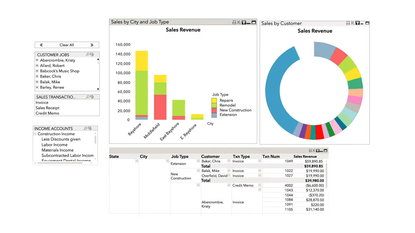
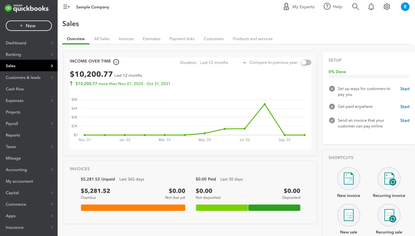
QuickBooks was developed by Intuit in 1998 as a double-entry accounting program for small businesses. This was a follow-up to the success of Quicken, which was more of a personal finance and home-office accounting solution. Today, QuickBooks is the most popular accounting software on the market.
QuickBooks Enterprise Overview
Although not an ERP, QuickBooks Desktop Enterprise does act as a light ERP software system. The all-in-one solution for business management allows smaller businesses to get ERP-level functionality at a fraction of a true ERP price. After Desktop Pro, Premier, and Mac were discontinued in 2024, Enterprise is the last QuickBooks Desktop product sold.
QuickBooks Enterprise includes financial management, sales orders, and inventory cost tracking features. It also offers 13 predefined user roles, which let you control each employee’s access to the program. These roles include accounts payable, accounts receivable, inventory management, payroll processor, and more.
QuickBooks has a 30-user cap, suitable for growing small businesses. However, if your business wants multiple users with predefined roles, you may want to look into a different system. QuickBooks Enterprise offers both locally installed and cloud-hosted services, in contrast to having to choose one or the other via QuickBooks Online.
QuickBooks Online Overview
QuickBooks Online is a popular accounting software known for its affordable price and user-friendly interface. The software offers features that enable you to track sales and expenses, create estimates, manage customers, and collaborate with an outside accountant. The software also features an invoicing module, which allows you to have your customers pay via credit card or ACH bank transfer.
For any area where QuickBooks Online falls short, the QuickBooks Apps store has hundreds of apps and add-ons available. These add-ons typically allow for non-financial functionality that QuickBooks doesn’t provide in its base package. This includes expense management, time tracking, CRM, and cash flow forecasting. Due to the flexibility these apps provide, QuickBooks Online can be as simple or as advanced a program as you want.
How Much Does QuickBooks Enterprise Cost?
The price of QuickBooks Desktop Enterprise starts at $1,703/year. This is for the “Silver” version, which includes basic functionality but excludes payroll. The “Gold,” “Platinum,” and “Diamond” editions start at $2,210/year, $2,717/year, and $5,364/year, respectively. Each adds additional features, like multi-company management and advanced inventory.
All QuickBooks desktop options are now subscription-based; users can no longer purchase a version of the software and use it indefinitely.
How Much Does QuickBooks Online Cost?
The price of QuickBooks Online starts at $38/month for the Simple Start version, intended for freelancers. This version will create basic reports, track income and expenses, organize your receipts, and help you invoice customers. Pricing plans go up in cost and functionality, ending with the Advanced edition, starting at $275/month.
Many versions of QuickBooks Online will include a 50% discount off the first 3 months. A free 30-day trial is available for the Simple Start and Plus plans; however, discounted pricing will not be available if you use the trial.
Payroll is available as an add-on to any version of QuickBooks Online. This price for payroll starts at an extra $50/month plus $6.50/employee/month when bundled with Online. A Premium and Elite version of payroll exists for an increased monthly and employee/month cost. These versions cover more powerful tools and on-demand experts to assist you with daily tasks.
Feature Comparison
Compare QuickBooks Enterprise and QuickBooks Online Advanced. This powerful version of QuickBooks Online rivals QuickBooks Enterprise through advanced features not found in other versions of the online product, including smart reporting for charting and graphs that help make business decisions, accelerated invoice automation, and access for up to 25 users with user permission settings.
The following table shows a feature comparison between QuickBooks Enterprise and QuickBooks Online:
| Feature | QuickBooks Enterprise | QuickBooks Online | Quickbooks Online Advanced |
|---|---|---|---|
| Sales Order Management | Yes | Yes (basic) | Yes (basic) |
| Credit Card Processing | Yes | Yes | Yes |
| Fixed Asset Management | Yes | No | No |
| Excel Import | Yes | Yes | Yes |
| Bank Reconciliation | Yes | Yes | Yes |
| Inventory Management | Yes | Yes | Yes (more limited than Enterprise) |
| Bin Location Tracking and Bar Code Scanning | Yes | No | No |
| Multi-entity Accounting | Yes | No | No |
| Batch Invoicing | Yes | No | Yes |
| Sales Forecasting | Yes | No | Yes (basic) |
| Custom Reports | Yes | Yes (basic) | Yes |
QuickBooks Online features will be more basic or well-rounded, better suited for many businesses. QuickBooks Enterprise has tools developed for specific scenarios and industries over the years. QBE may lack the mobility of QBO, but it more than makes up for it with its comprehensive feature set.
Number of Users
The number of users may be an important deciding factor for your business as you ensure every staff member gets access to the program.
- QuickBooks Online Plus: Up to 5 users
- QuickBooks Online Advanced: Up to 25 users
- QuickBooks Enterprise: Available in 1-10 or up to 40 users (Enterprise Diamond is sold in increments of 1-10, 20, 30, and 40 users).
Remember that these are for concurrent users, or users that require access simultaneously. It’s possible (and even encouraged) to have users share the same logins in order to save on software expenses. However, this may not be the type of audit trail your company desires.
While QuickBooks Online can handle a high volume of users (depending on your version), it performs best when using 5 or fewer users. If you require more, you’ll need the Advanced plan that offers 25 users. Beyond that, your needs have likely exceeded what QuickBooks Online will offer you long-term, and it may be time to consider upgrading to an ERP.
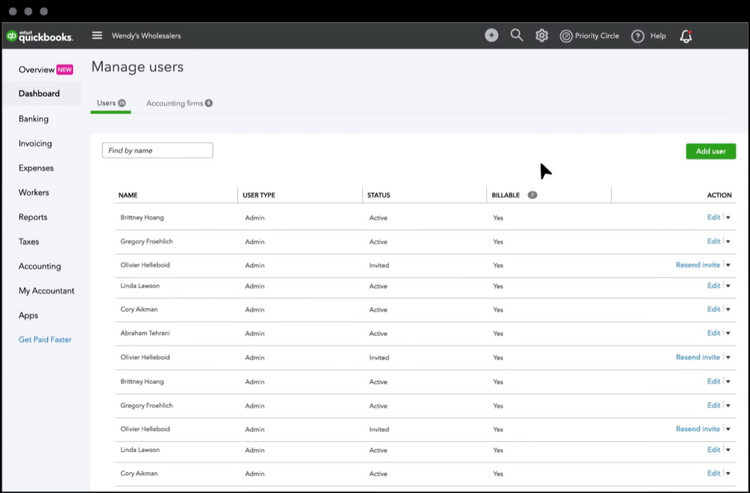
QuickBooks Enterprise vs QuickBooks Online: Which is Best?
After reviewing and testing both software options, it really depends on your business. QuickBooks Desktop Enterprise generally takes the lead for larger small businesses because of its in-depth features and scalability. But QuickBooks Online is usually the better option for most small businesses—it has more flexible pricing and feature options that make it more accessible for companies just needing a simple accounting platform. Plus, its cloud-native architecture makes it accessible from anywhere with internet access.
QuickBooks Desktop Enterprise caters to businesses looking for deeper insights, detailed reporting, and higher user limits. So, when it comes to intricate financial management, predefined user roles, and capacity for growth, QuickBooks Desktop Enterprise does hold an edge. That said, businesses just starting or those prioritizing ease-of-use will probably still opt for Online. Plus, with Desktop slowly being discontinued, it’s hard to recommend it for new users.
Check out our complete roundup of the best accounting software for other options, or read more about the best QuickBooks alternatives.
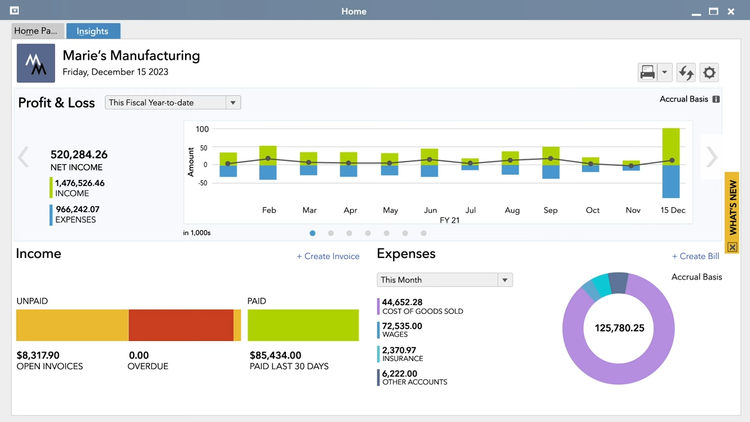
Frequently Asked Questions
What is the difference between QuickBooks Enterprise and Quickbooks Online?
QuickBooks Enterprise is intended for smaller manufacturing and distribution businesses. QuickBooks Online is for more accounting-focused businesses looking for a web-based system, and/or a business that wants access to the large app-based ecosystem QuickBooks offers.
Is QuickBooks Enterprise available online?
Yes, QuickBooks Enterprise has a cloud-hosted option that gives you access to the software anytime, anywhere, and with any device. QuickBooks Desktop Enterprise with Hosting is a subscription plan and incurs an additional cost on top of the standard Enterprise licensing costs. Hosting for QuickBooks Enterprise is provided via Right Networks, which also performs all data backups nightly. The cloud-hosted version of QuickBooks Enterprise operates as you would expect most remote desktop services.
Is QuickBooks Online Advanced the online counterpart to QuickBooks Enterprise?
Both QuickBooks Online Advanced and QuickBooks Enterprise are intended to be used by small businesses with complex needs (such as manufacturers or distributors) who also require advanced inventory. The main differences come in deployment preference and pricing plans. However, businesses with ever-changing needs may prefer the freedom offered by the applications offered within QuickBooks Online.
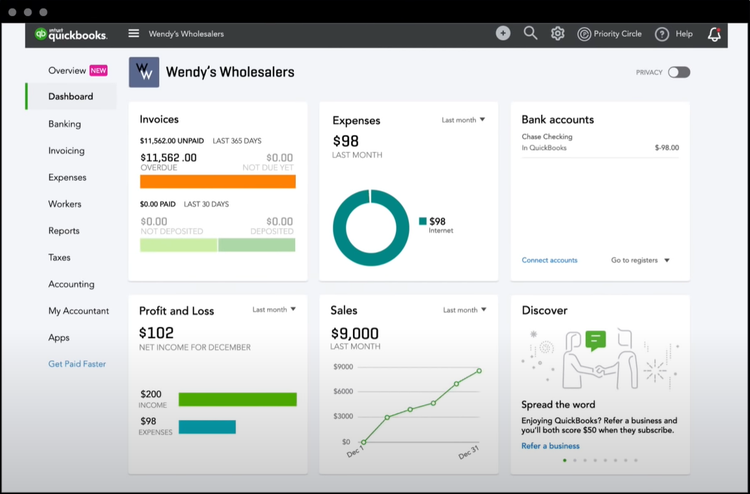
What is the difference between QuickBooks Enterprise and Accountant?
QuickBooks Enterprise is best used in any small to mid-sized business that requires a large amount of transactional data. QuickBooks Accountant is specifically designed for accounting firms and bookkeepers to handle accounting transactions for companies that are not their own. The Accountant’s version provides bookkeeping services that can import accountant copy files from clients, batch enter transactions, and run a working trial balance report.
Can you buy QuickBooks Enterprise without a subscription?
No. As of late 2015, QuickBooks Enterprise requires an ongoing subscription to gain access to the software. This is independent of your deployment method (whether running the software on-premise or in the cloud).
Is QuickBooks Desktop being phased out?
Yes and no. QuickBooks used to offer four core versions that were locally installed on your desktop:
But in 2024, Pro, Premier, and Mac were discontinued, leaving Enterprise as the only option. While it’s still being sold, many believe that Desktop will be removed entirely in the near future. This has been further enforced by the release of Intuit Enterprise Suite, which seems to be the cloud-native replacement of Desktop.
Why is QuickBooks desktop better than online?
Users of desktop versions of QuickBooks say that you’ll experience faster run times, fewer bugs, and better customer support than the online counterpart. Desktop versions of QuickBooks consistently receive higher ratings across review websites, although this could be due to the history of QuickBooks Desktop vs Online. QuickBooks Desktop is usually preferred if you are looking for industry-specific features or have more complex accounting needs.
What are the pros and cons of QuickBooks Online vs Desktop?
QuickBooks Online is easier to learn and use on a daily basis with the accessibility of offers across multiple devices and the number of available automation and applications. However, the program is more “generic” and won’t give you the most industry-specific capabilities. It also lacks the level of customization that some companies may prefer.
Do you have to renew QuickBooks Enterprise every year?
Yes. Once purchased, QuickBooks Enterprise is licensed for 3 years. If you fail to renew your solution each year, you are still welcome to continue using the solution on your desktop, but you will be limited to 1 user license and no ongoing support.
Do I have to buy QuickBooks every year?
If you have a desktop version of QuickBooks, please see the answer to our previous question above. If you subscribe to an online version of QuickBooks, then yes, you will need to pay the annual/monthly subscription cost to continue using the software. Failure to do so will prevent you from accessing your data.
Does QuickBooks Enterprise work on a Mac?
No. QuickBooks Desktop Enterprise is intended to be used on a Windows O/S and requires a native application. Intuit no longer sells QuickBooks Desktop for Mac. However, QuickBooks Online runs in your web browser and thus is compatible with either Windows or a Mac.



























